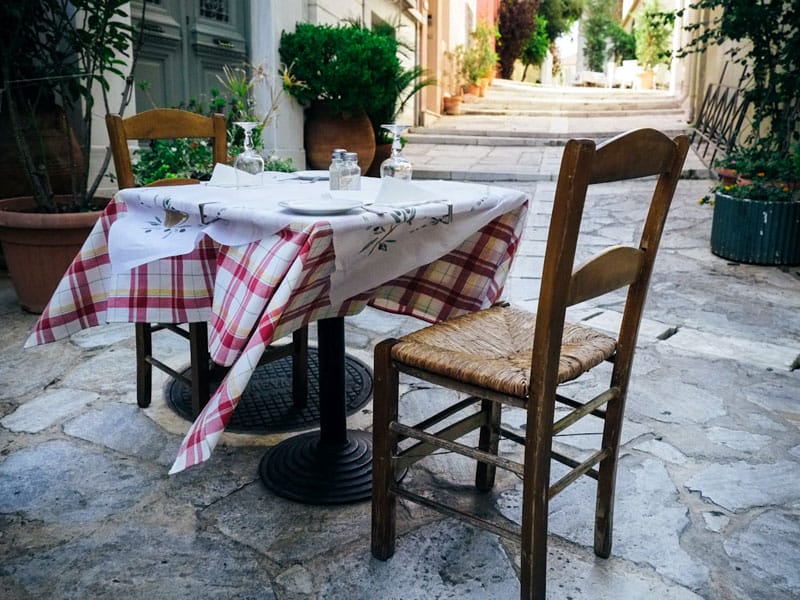Editor’s note: This is the first piece in a series in which we explore the hidden gems in some of Athens’ most touristy neighborhoods. The streets of Psyri, Plaka, Gazi and other popular areas are full of restaurant signs trying to lure diners in, but which of them are truly worth your time and money? Culinary Backstreets is on the case.
The neighborhood of Psyri is by all means a peculiar Athenian phenomenon. An old-fashioned commercial district just next to bustling Monastiraki, Psyri (aka Psirri) was once mostly filled with leather workshops and small businesses. Starting in the mid-’90s, the area enjoyed a rapid gentrification and became home to artists, architects and designers, while alternative cafés, bars and tavernas took the place of the longstanding shops.
By the middle of the first decade of the 21st century, however, Psyri had become an Athenian version of hell: kitschy, noisy bars reminiscent of package holiday-style entertainment, industrial-style food, a growing drug problem. Eventually, most of the clubs and loud bars closed up shop and the neighborhood fell out of fashion. Today, it’s a quieter destination filled with numerous touristy tavernas and restaurants, many of which have someone out front trying to lure customers inside.

Oinopoleion, which means “wine shop,” has been around since 1928 – long before Psyri became popular as a dining and nightlife destination – and has remained a family business. The name of the venue is no accident: the Markou family that owns it has maintained a vineyard in Markopoulo, just outside Athens, since the late 19th century. The space that houses Oinopoleion was originally used as a storage depot for the wines but was also a mageireio, a wine and “cook-house” for locals. Though it has more recently been renovated and redecorated as a restaurant, Oinopoleion has stayed true to its roots, offering a variety of affordable house wines straight from the family’s vineyards. There are four whites, including a decent retsina (which starts at just €2 for a small glass) and a cabernet sauvignon blanc de noir that is only offered by the bottle (still a bargain at €15). Reds range from the easily drinkable Greek variety agiorgitiko to a full-bodied merlot. All are excellent value for money.
The interior of Oinopoleion resembles that of a high-ceilinged Greek taverna, but it’s the small patio in the back – a wooden deck surrounded by wooden trellises covered with climbing plants – that scores the most points. The outdoor tables are set with rustic-looking plaid tablecloths in pastel colors and there is a small lantern at each table. It is a peaceful setting, the only distraction being the small army of black and white cats that love appearing out of nowhere to serenade customers with their constant meowing. The clientele is a mixture of locals and tourists – on any given night, customers might range from German couples who insist on drinking one beer after the other to neighborhood folks who have popped in for a quick bite.

The food is a step up from the tourist-oriented fare found at most tavernas in the area. Not only are the ingredients used – extra-virgin olive oil from Kalamata, fresh fish and meat, and seasonal vegetables – of good quality, but the dishes tend to be more creative. A good example of the imaginative spin put on traditional Mediterranean dishes is the tabbouleh salad. Served on a beautiful porcelain plate, this dish turned out to be the star of our meal. We’re accustomed to tabbouleh salads that are made with parsley and dill and have a zingy lemon flavor. Oinopoleion’s version was made with basil pesto and crunchy green onion, which gave it a soft, refreshing flavor with a hint of cucumber and basil. Despite the large size of the portion, we devoured every last bit.
The kolokythokeftedes and tomatokeftedes (fried zucchini and fried tomato balls, respectively) were also done very well, avoiding the one-note heaviness that often mars these classic dishes. Crunchy on the outside, yet soft and cheesy on the inside, the zucchini balls came with a hearty serving of Greek yogurt sprinkled with paprika, which complemented the flavor of the patties perfectly. We also tried one of the venue’s heartiest dishes, the “eggs in Purgatory,” two fried eggs accompanied by apaki (a smoked pork delicacy from Crete) in tomato sauce. The dish was delicious and surprisingly light; the apaki was of good quality and the tomato sauce tasted almost fruity.
There is live Greek music playing some nights of the week at Oinopoleion and it’s genuinely good, the band either playing rembetika (known as the blues of Greece) or even traditional music from Northern Greece. It’s just one more element that makes the venue such a rare find: a tourist-friendly taverna loved and cherished by locals.
 June 28, 2013 Diamonds in the Touristy Rough: Plaka Dining Secrets
June 28, 2013 Diamonds in the Touristy Rough: Plaka Dining Secrets
Editor’s note: This is the second piece in our series featuring the hidden gems in some […] Posted in Athens August 5, 2021 Diporto
August 5, 2021 Diporto
In business since 1887, Diporto – a defiantly traditional spot in downtown Athens – has […] Posted in Athens April 3, 2019 Peinaleon
April 3, 2019 Peinaleon
The neighborhood of Exarchia in downtown Athens has long played a storied role in the […] Posted in Athens
Published on June 10, 2013
Related stories
June 28, 2013
AthensEditor’s note: This is the second piece in our series featuring the hidden gems in some of Athens’ most touristy neighborhoods. We previously explored Psyri; it is now time to take on the holy grail of Athenian tourism: Plaka. There’s a reason why this area of old Athens, just below the Acropolis, is the city’s…
August 5, 2021
AthensIn business since 1887, Diporto – a defiantly traditional spot in downtown Athens – has no sign and no menu. The staff doesn’t speak a word of English, and you might have to share a table with eccentric old men who look like they stepped out of a folk ballad. You will probably have to…
April 3, 2019
AthensThe neighborhood of Exarchia in downtown Athens has long played a storied role in the social and political history of Greece. Bordering the National Technical University of Athens, also known as Athens Polytechnic, where students staged a massive uprising against the Greek military junta in 1973 that resulted in a violent repression, and the Law…



















































































